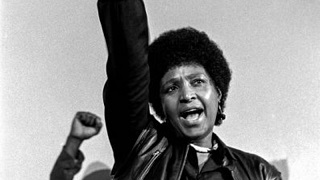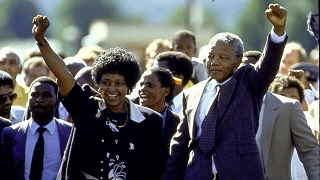
|
View mobile-friendly version
| Don't like reading? Look below! |
| Click here or the image above to watch this post on YouTube |
On Apr 2nd 2018, the world said goodbye to Winnie Mandela, former wife of late South African national hero, president and global icon for peace and human rights - Nelson Mandela.
This lady had an indelible effect on me as a young middle-school student, not just because she was one of the most important women in the world at that time but because she was widely accepted as a genuine freedom fighter, a term traditionally reserved for men.
Furthermore, she assumed the role of the face of "the struggle" - an affectionate nickname for the anti-apartheid movement - after her iconic husband's incarceration on trumped-up charges.
This is my tribute to her.
Night after night, the TV news was riddled with images of mass demonstration, police brutality and bloody violence. My parents tried to shield me from it by sending me to my room to play, but I would sometimes sneak back out and peek around the corner - to my complete horror.
Men, women and children - some my own age - being cruelly hosed-down, beaten, gased and attacked with dogs. I couldn't understand why this was happening to them... I just knew that it wasn't right.
Terms like township and places like Cape Town, Soweto, Johannesburg and wider Pretoria - which I had never seen or heard of before - became seared into my brain as temples of torture and symbols of segregation.
But there were other images too: images of struggle, determination, resilience, conviction, faith and hope; images of a woman called Winnie.
She mobilized the black South African masses in the name of a man, a renowned ghost of the same surname. Winnie mentioned him every single time that she spoke - and people listened intently whenever she spoke - making sure that though he was no longer seen, he would never be forgotten.
She told her followers that this ghost was alive and well, fortified with spirit and content in the knowledge that "the struggle" would endure through them. I remember that she would end every speech with the inspirational mantra "Arman-za!", to the boisterous eruption of an already fired-up crowd.
Indeed she was the face of "the struggle".
In doing this Winnie not only kept the name "Mandela" at the forefront of her people's consciousness, she also piqued the curiosity of a young, middle-school girl - way over on the other side of the world - to learn about this ghost... who is Mandela, and why is he in prison?
I began asking my parents and teachers some visibly uncomfortable questions about South Africa and the apartheid system, so many in fact that they sometimes had to get back to me because I had them stumped.
I marveled at how this lady - a mere woman in a country, continent and world where women bore little significance (let alone influence) besides motherhood - was able to command the respect, loyalty and devotion of millions - even in the face of violence, pain, incarceration and sometimes death.
Winnie Mandela taught me that women could and do matter. Yes - women can lead, women can mobilize, women can change the world!
On Feb 11th 1990, I was glued to the TV as I watched recorded footage of Winnie Mandela escorting her husband, hand firmly in his, out of Robben Island Prison as a free man.
Thus ended the apartheid era, signaling the dawn of South African reconciliation and healing. This was in no small part due to the undying resolve and selfless sacrifice of a woman called Winnie Mandela.
No-one is without fault in this life, and Winnie was no exception. In 1996, then president Nelson Mandela quietly divorced her after she was accused of murder, human torture and kidnapping allegedly occurring during the height of the apartheid era.
This was clearly no easy decision for him, to abandon the woman who had seen him through 27 years of wrongful imprisonment. It's therefore no wonder that he visited her often in jail, even though he was then president of South Africa.
We may never know or understand why Winnie faltered, but her heroic role in the anti-apartheid revolution and the liberation of South Africa's indigenous people is indisputable.
At Nelson Mandela's funeral in Dec 2013, as a unified nation wept for its father - its "Madiba" - and the wider world mourned the loss of a sterling citizen, Winnie was seen in yet another supportive role - this time in symbiosis - as she and Mandela's widow each sought solace in the arms of the only person who could truly understand their loss - each other.

| Last Week On Donna's Glorious Giveaways: |
Rest easy, Winnie, for your triumphs far outweigh your sins.

|
Thanks for taking the time, folks
Donna
Like this post? Then click here to make sure you never miss one like it!
Wanna sneak a peek at my unlisted posts? Click here.
No comments:
Post a Comment